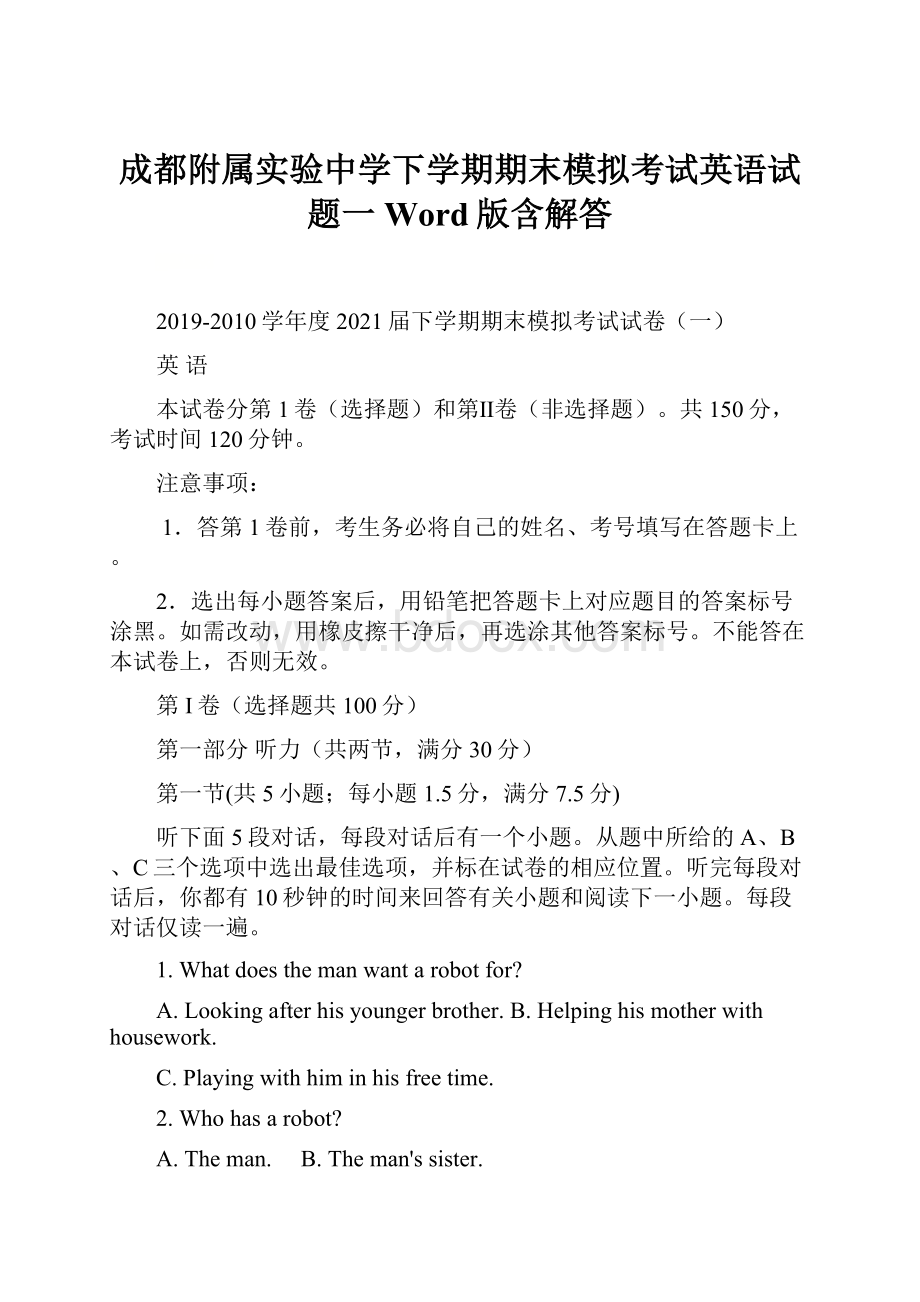成都附属实验中学下学期期末模拟考试英语试题一Word版含解答.docx
《成都附属实验中学下学期期末模拟考试英语试题一Word版含解答.docx》由会员分享,可在线阅读,更多相关《成都附属实验中学下学期期末模拟考试英语试题一Word版含解答.docx(16页珍藏版)》请在冰豆网上搜索。

成都附属实验中学下学期期末模拟考试英语试题一Word版含解答
2019-2010学年度2021届下学期期末模拟考试试卷
(一)
英语
本试卷分第1卷(选择题)和第Ⅱ卷(非选择题)。
共150分,考试时间120分钟。
注意事项:
1.答第1卷前,考生务必将自己的姓名、考号填写在答题卡上。
2.选出每小题答案后,用铅笔把答题卡上对应题目的答案标号涂黑。
如需改动,用橡皮擦干净后,再选涂其他答案标号。
不能答在本试卷上,否则无效。
第I卷(选择题共100分)
第一部分听力(共两节,满分30分)
第一节(共5小题;每小题1.5分,满分7.5分)
听下面5段对话,每段对话后有一个小题。
从题中所给的A、B、C三个选项中选出最佳选项,并标在试卷的相应位置。
听完每段对话后,你都有10秒钟的时间来回答有关小题和阅读下一小题。
每段对话仅读一遍。
1.Whatdoesthemanwantarobotfor?
A.Lookingafterhisyoungerbrother.B.Helpinghismotherwithhousework.
C.Playingwithhiminhisfreetime.
2.Whohasarobot?
A.Theman.B.Theman'ssister.
C.Thewoman'ssister.
3.Whatdoesthemanthinkofthewoman?
A.Sheiscarelesswithmoney.B.Shehasgoodtasteinclothing.
C.Sheisabletomakemoney.
4.Whatdoesthemanwishtherobotcoulddo?
A.Sing.B.Dance.
C.Playchess.
5.Whatarethespeakerstalkingabout?
A.Theman'smistake.B.Theman'sbehavior.
C.Theman'sjobinterview.
第二节(共15小题,每小题1.5分,满分22.5分)
听下面5段对话或独白。
每段对话或独白后有几个小题,从题中所给的A、B、C三个选项中选出最佳选项。
听每段对话或独白前,你将有时间阅读各个小题,每小题5秒钟;听完后,各小题将给出5秒钟的作答时间。
每段对话或独白读两遍。
听第6段材料,回答第6、7题。
6.Whatisthewoman?
A.Anurse.B.Adentist.
C.Aresearcher.
7.WhatdoesthewomanthinkoftherobotHanako?
A.Expensive.B.Special
C.Helpless.
听第7段材料,回答第8至10题。
8.Whatdoesthewomando?
A.Astudent.B.Ateacher.
C.Adoctor.
9.Whatarethekidsinthespeakers'classlike?
A.Active.B.Rude.
C.Shy.
10.Whydoesthewomanhavetoleave?
A.Herkidneedstobetakencareof.B.Shehasanotherjobinahospital.
C.Herparentsareinpoorhealth.
听第8段材料,回答第11至13题。
11.Wheredoestheconversationtakeplace?
A.Athome.B.Inarestaurant.
C.Inadepartmentstore.
12.Whomadetherobot?
A.Ayoungteacher.B.AGermanengineer.
C.Anoldcook.
13.Whatdoesthewomanwanttodo?
A.Buyhermotherarobotcook.B.TakeacookingcourseinBeijing.
C.Holdabirthdayparty.
听第9段材料,回答第14至17题。
14.Howlonghasthemanbeenworkinginthezoo?
A.For25years.B.For20years.
C.For15years.
15.Nowdoesthemandescribehiswork?
A.Hard.B.Well-paid.
C.Interesting.
16.Whendoesthezoocloseinwinter?
A.At4:
30pm.B.At5:
30pm.
C.At6:
30pm.
17.Whatdoesthemandointhezoo?
A.Heclearsoutcages.B.Hefeedstheanimals.
C.Hedoesthemanagementwork.
听第10段材料,回答第18至20题。
18.WheredidJoellive?
A.InBell.B.InMontebello.
C.InLosAngeles.
19.HowlongdidittakeJoeltopasshiswrittentest?
A.Sixdays.B.Amonth.
C.Sixweeks.
20.HowdidJoellearntodriveintheend?
A.Hisuncletaughthim.B.Hiscousintaughthim.
C.Hetaughthimself.
【答案】1-5ABACC6—10BABAC11—15BCABA16—20BCACC
第二部分阅读理解(共两节,满分40分)
第一节(共15小题;每小题2分,满分30分)
阅读下列短文,从每题所给的A、B、C和D四个选项中,选出最佳选项。
A
SummerBoardingCourses
SummerBoardingCourses(SBC)isanaward-winningUKsummerschoolproviderforinternationalstudentsaged11-17.Pleasejointhestudentsfromover100countries.
SBCCanfordSummerSchool(Ages11-15)islocatedatCanfordSchool,TatlerSchoolAwardsPublicSchooloftheYear2019.ItiswithineasyreachofthecoastaltownofBournemouthandisoneofthemostpopularUKdestinationsforEnglishlanguagelearningoutsideofLondon.
Dates:
Monday6July-Monday10August2020namstt
TeachingHours:
15HoursPerWeek
Courses:
GeneralEnglish,EnglishLiterature,IntroductiontoBusiness
HeadingtonOxfordSummerSchool(Ages13-16)islocatedinthebeautifulcityofOxford,justa30-minutewalkfromthecitycentre.Itprovidesstudentswithawonderfulsettinginwhichtostudyandmeetotherstudentsfromaroundtheworld.
Dates:
Saturday4thJuly-Saturday18thJuly2020
TeachingHours:
20HoursPerWeek
Courses:
GeneralEnglish,SummerStudy,GlobalYoungLeaders
SBCatEtonCollege(Ages11-16),only34kilometersfromLondon,providesstudentswiththeopportunitytostudyatoneoftheworld’smostfamousschools.Foundedin1440byKingHenryVI,EtonCollegehaseducated20BritishPrimeMinistersaswellasmanyauthors,scientists,actorsandexplorers.
Dates:
Monday13July-Monday24August2020
TeachingHours:
15HoursPerWeek
Courses:
GeneralEnglish,Mathematics,STEM(Science,Technology,Engineering,Maths)
OxfordCollegeSummerSchool(Ages15-17)givesstudentsthechancetoexperiencetheverybestofwhatOxfordhastooffer.StudentsliveandstudyinthefamousuniversitycityofOxford.Forover800yearsithasbeenhometotheleadingacademicmindsinscientificandculturalstudies.
Dates:
Monday6July-Monday17August2020./
TeachingHours:
15HoursPerWeek
Courses:
Business&Leadership,Engineering,Medicine
21.Whichschooldoesn’tprovideGeneralEnglish?
A.SBCCanfordSummerSchool.
B.HeadingtonOxfordSummerSchool.
C.SBCatEtonCollege.
D.OxfordCollegeSummerSchool.
22.WhatmakesSBCatEtonCollegedifferentfromtheothers?
A.Ithasproducedmanyheadsofgovernment.
B.Ithaseducatedsomeleadingacademicminds.
C.Ithasinvitedauthorsandscientistsaseducators.
D.IthasbecomeawinnerofTatlerSchoolAwards.
23WhichagerangeisHeadingtonOxfordSummerSchoolfor?
A.Ages11-15.B.Ages13-16.
C.Ages11-16.D.Ages15-17.
【答案】21—23DAB
B
DNAanalysishasrevealedfamilyrelationshipsbetweenmorethan10generationsofStoneAgepeopleatmegalithic(巨石的)tombsinIrelandandSweden.
Theevidencesuggeststhatmegaliths,prehistoriclargestonestructures,sometimesactedasgravesforfamilygroupsinnorthwesternEuropethousandsofyearsago.Thelatestfindingsthrownewlightontheoriginsandsocialstructureofthegroupsthatbuiltmegalithsinthisregion—ahistorythathaslongbeenhiddeninmystery.
Fortheirstudy,theinternationalteamofresearchersanalyzedthegenomes—thecompletesetofgeneticmaterialinacell—of24StoneAgeindividualsfromfivemegalithicburialsitesinIreland,ScotlandandGotland,alargeSwedishislandintheBalticSea.
Thisanalysisshowedthatmanyoftheindividualsburiedateachmegalith,whoalllivedbetween3,800B.C.and2,600B.C.,accordingtoradiocarbon-datingoftheirremains,werecloselyrelatedviafamilyties.
TheresultsalsoshowedthattheindividualsburiedatthemegalithswererelatedtoNeolithicfarmersinnorthernandwesternEuropebutgeneticallydistinctfromotherhunter-gatherers.ThiswasparticularlynoticeableattheAnsarvesiteontheislandofGotland.
“ThepeopleburiedintheAnsarvetombareremarkablydifferentonageneticlevelcomparedtotheindividualsdugoutfromhunter-gathercontexts,showingthattheburialtraditioninthismegalithictomb,whichlastedforover700years,wasperformedbydistinctgroupswithrootsintheEuropeanNeolithicexpansion,”MagdalenaFraser,co-firstauthorfromUppsalaUniversity,saidinthestatement.
24.What’sthesignificanceofthenewfindings?
A.ItrevealsthefamilytiesbetweenpeopleinIrelandandSweden.
B.Itimpliesthatmanypeopleburiedinthetombswerecloselyrelated.
C.Itindicatesthelong-hiddenmysteryconcerningDNAanalysis.
D.Itsuggeststhatthemegalithsbecametombsthousandsofyearsago.
25.Howdidtheresearchersreachtheirfindings?
A.Byinterviewingindividuals.
B.Bytravellingtodifferentregions.
C.Byanalyzinggenes.
D.Bystudyingtheburialsites.
26.Whichistrueaccordingtothelatestfindings?
A.Somepeopleburiedinthetombswererelatedtofarmers.
B.Fewpeopleburiedinthetombsweregeneticallydifferent.
C.Allthepeopleburiedatmegalithshadfamilyrelationships.
D.PeopleburiedintheAnsarvetombweredugout700yearslater.
27.What’sthemainideaofthispassage?
A.Megalithsservedastombsthousandsofyearsago.
B.Peopleburiedatthemegalithswererecentlyanalyzed.
C.Latestfindingsshedlightonamysteryaboutburials.
D.Stone-AgepeopleinIrelandandSwedenhadcloseties.
【答案】24-27BCAD
C
Ultrasound(超声)isusedwidelyinmedicalimaging,butinrecentyearsscientistshavestarteddevelopingitforanotheruse:
stimulatingnervestotreatdisease.Intwonewstudiesinmice,researchersfocusedthesoundwavesonnervesinthespleen(脾)thatcommunicatewiththeimmunesystem,reducingsymptoms.Iftheapproachprovessafeandeffectiveinpeople,itcouldserveasatreatmentfordiseasessuchasarthritis(关节炎).
Inonestudy,ledbyscientistsattheFeisteinInstituteandGEResearch,micereceivingafewminutesofultrasoundtreatmenttothespleennervehadadiminishedsymptomstoaninjected(注射)poison.Inanotherstudy,researchersattheUniversityofMinnesotaandtheircolleaguesreducessymptomsofarthritisinmicebystimulatingtheirspleennervesfor20minuteseverydayforaweek.“Zeroinginonthespleenmayprovideamorepreciseapproachthanfocusingonthevagusnerve(交感神经),whichconnectswiththeimmunesystemviaasecondnervethatstimulatesthespleen.”saysHubertLin,leadauthorofthelatterstudy.“Whenwe’retargetingthespleenwehavelessofaneffectalloverthebody.”
“Littleisknownabouthowrepeatedultrasoundaffectsthespleenorwhetherithasotherharmfuleffects,”saysneuroscientistDeniseBellingerofLomaLindaUniversity,whowasnotinvolvedineitherstudy.Anongoingclinicaltrialaimstoassessthetreatment’ssafetyinhumanswitharthritis.Abiggerunknownishowultrasoundactivatesingeneral.Scientistsarenowexploringtheuseofultrasoundonotherpartsofthenervoussystem,includingthebrain.“Weknowhowtocontrolnerveswithelectricity,andwe’vebeendoingitformorethan100years,”neuroscientistKevinTraceysays,“Buttheideaofcontrollingnervesignalswithultrasoundisabrand-newfield.”
28.Whatdoscientistsexpectofthenew